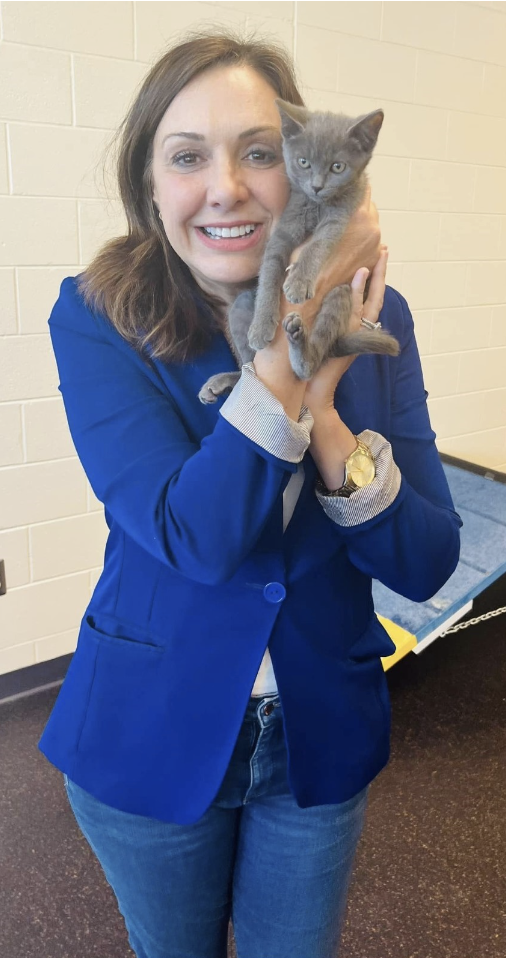Dear Neighbors,
I hope this newsletter reaches you and your family safe and healthy. I hope you’ve all been enjoying the weather and are looking forward to an enjoyable summer.
Featured in this newsletter:
- June is Pride Month!
- Community Update
- 2023 Michigan Environmental Justice Conference
- Imposter Scams Take on New Forms: Missed Jury Duty and Demand for Payment Scams
- End of Federal COVID-19 Public Health Emergency Brings Changes to Insurance Coverage for Michiganders
- Helping Medicaid members keep their coverage
- MDARD Encourages Owners to Help Keep Their Animals Cool and Safe as Temperatures Rise
Should you need any help, please do not hesitate to contact my office by phone at (517) 373-7350 or by email at SenDPolehanki@senate.michigan.gov.
Working for you,

Dayna Polehanki
State Senator
District 5
June is Pride Month!

June is Pride Month! The word ‘pride’ is an integral cultural concept within the LGBTQ community, representing solidarity, collectivity, and identity as well as resistance to discrimination and violence.
This year, my colleagues and I passed a law expanding the Elliott-Larsen Civil Rights Act’s protected categories to include sexual orientation and gender identity or expression as prohibited categories for discrimination. With more work left to be done, we must continue our efforts to expand the community’s access to equal standing under the law.
Community Update
Receiving the “Brandi Award”

It is a great honor to have earned the “Brandi Award” from the Animal Law Section of the State Bar of Michigan for my work in the legislature around animal welfare. I am grateful for Attorneys for Animals and Michigan Humane for hosting. Oh, and kittens!

2023 Michigan Environmental Justice Conference
WHEN: June 21-22, 2023
WHERE: Detroit, Michigan
The 2023 Michigan Environmental Justice Conference will focus on the theme of Advancing Environmental Justice: Working Together toward Progress. Conference attendees can learn about and engage with environmental justice related resources and programs from various state of Michigan departments and other organizations at the Resource Fair. There will also be a Poster Gallery to hear from presenters about their environmental justice research and projects. The goal of this 2-day, in-person conference is to convene conversations, explore actions, present research and continue progress toward achieving environmental justice in Michigan.
The conference is intended for anyone interested in environmental justice, including front-line communities, business and industry, labor, local, tribal, state, and federal government, policy makers, public health practitioners, academic and community-based researchers, community and environmental organizations, and environmental justice and community advocates.
Registration deadline: June 12, 2023. For more information and registration details, click here.
Imposter Scams Take on New Forms: Missed Jury Duty and Demand for Payment Scams
Michigan Attorney General Dana Nessel warns residents that they may be targeted by scammers claiming to be representing government entities.
The Department has received reports that a missed jury duty scam is currently being perpetrated in Oakland County. In this scam, fraudsters call unsuspecting residents and tell them that they have failed to appear for jury duty in federal court. The caller threatens the person with arrest if they don’t pay a “cash bond,” which has reportedly been as high as $5,000.
So far, two complaints involving the missed jury duty scam have been reported to the Oakland County Sheriff’s Office. In both cases, the scammer claimed to be an Oakland County Sheriff’s deputy. Though in both instances cash was demanded to keep the call recipient out of jail, neither person paid. Instead, they turned themselves in only to discover that there were no arrest warrants sworn in either case.
Another imposter scam involves letters mailed to residents that appear to be from a state agency. The letters, which indicate that they are a “final demand for payment” related to a tax lien, threaten potential foreclosure unless payment is made.
One such letter sent to a nursing center in Detroit from the “Tax Lien Group Tax Processing Unit” indicated the “State of Michigan may seize [the] property for nonpayment of taxes.” The amount listed on the letter was $27,622, but no tax debt was owed to the State. The letter contained an 800-phone number commonly used to perpetrate similar scams.
The individuals perpetrating these scams may expand the deception to other agencies, such as the FBI, IRS, or some other state or federal government entity. If you are concerned that you are being targeted by a government imposter, you can protect yourself by doing your own internet research. Looking up the phone number for the government agency allows you to call and inquire without relying upon information provided by the scammer.
Residents can also simply do an internet search for the phone number they are being asked to call. This may help determine whether it belongs to a government agency or if it is one being used in scams. AG Nessel wants all Michigan residents to be on the alert so they can avoid being scam victims.
For more information about popular consumer scams, or if you believe you’ve been a victim, residents can contact the Consumer Protection Team Monday-Friday at 877-765-8388 or complete the online complaint form.
End of Federal COVID-19 Public Health Emergency Brings Changes to Insurance Coverage for Michiganders
The Michigan Department of Insurance and Financial Services (DIFS) is alerting consumers that there may be changes to their health insurance coverage for COVID-related testing and treatments now that the federal COVID-19 Public Health Emergency (PHE) has ended.
Federal law required that many health services related to COVID-19, including testing and vaccinations, had to be covered at no cost for the duration of the PHE. Many Michiganders may now have to pay out-of- pocket for some COVID-related care. For more specific information about different types of medical care that have been affected by the ending of the PHE, see below:
At-Home and Laboratory COVID Tests:
- Private Insurers: The federal mandate requiring health insurers to provide no-cost coverage for COVID-19 testing, including at-home tests, has ended. Most people with health insurance will continue to have coverage for laboratory COVID-19 tests, subject to the plan’s cost sharing. At-home testing for COVID-19 is an eligible medical expense for flexible spending arrangements (FSAs) and health savings accounts (HSAs). Michiganders should check with their plan for more details.
- Medicare: Medicare is no longer required to provide coverage for at-home COVID-19 testing. Medicare Part B participants can still obtain laboratory COVID-19 testing, with authorization by a medical provider, without out-of-pocket cost. Medicare Advantage participants may have additional flexibility regarding COVID-19 testing. Michiganders should check with their plan for more details.
- Medicaid: Under federal law, Medicaid and MIChild participants can obtain at-home and laboratory COVID-19 tests through September 30, 2024.
COVID-19 Treatments:
Private insurers: Treatment for COVID-19 will continue to be covered but insurers are now able to apply cost sharing, such as deductibles and coinsurance, and require prior approval for these treatments. Michiganders should confirm coverage with their insurer or plan before seeking treatment.
Medicare: Medicare beneficiaries may have to pay for a portion of their COVID-19 care as required by their plan.
Medicaid: Medicaid and MIChild are required to cover all drugs for the treatment or prevention of COVID–19 with no cost sharing for enrollees through September 30, 2024.
COVID-19 Vaccinations:
COVID-19 vaccinations continue to be supplied with no out-of-pocket cost by the federal government.
DIFS can help consumers with health insurance questions and complaints. Contact DIFS Monday through Friday from 8 a.m. to 5 p.m. at 877-999-6442 or Michigan.gov/HealthInsurance. For more information about the state’s Medicaid and MIChild programs, visit the MIBridges website.
Helping Medicaid members keep their coverage
Take action to avoid a gap in coverage
At the beginning of the COVID-19 pandemic, the federal government declared a Public Health Emergency (PHE), allowing Medicaid members to keep their health care coverage. Per recent federal legislation, eligibility renewals will start again in June. Monthly renewal notifications will be sent by mail beginning in May.
Following these steps will help determine if you still qualify:
- Make sure your contact information is up to date.
- Check mail or text messages for a letter.
- Complete your renewal form (if you get one).
If you’re a Medicaid member, learn more about how these changes may affect your health care coverage at Michigan.gov/2023benefitchanges.
MDARD Encourages Owners to Help Keep Their Animals Cool and Safe as Temperatures Rise
As temperatures rise into the 90s in many parts of the state, the Michigan Department of Agriculture and Rural Development (MDARD) is reminding owners of some of the best ways to keep animals cool and safe.
Keep animals safe from the heat by following these tips:
Let it Flow: Provide unlimited cool clean, fresh water
- Just like people, animals can quickly get parched in hot temperatures. No matter the species, animals should have access to unlimited cool, clean, fresh water to prevent dehydration.
Know Their Limits: An animal’s ability to tolerate heat varies
- An animal’s age, breed, type of coat, and health history can all play a role in their ability to tolerate the heat. Keep an eye on them for signs of heat stress—like increased panting or drooling and being more lethargic. If they are showing these signs, it is time to immediately move them to a cooler area. Also, consider talking to your veterinarian. They will have a greater knowledge of your animal(s) and be able to give more specific guidance on how to best handle them in hot weather.
Happy Paws: Test surfaces to make sure they won’t burn paws
- Surfaces like asphalt, concrete, and sand can really heat up in the sun, which can burn paws— or at least make a walk very uncomfortable. To test if a surface is too hot, touch it with the palm of your hand. If it is too hot for you, consider taking a different route that is mostly grass or waiting until the evening when everything has had a chance to cool.
Get in Gear: Parked vehicles are not places to park pets
- Even when temperatures feel more moderate, vehicles can heat up very quickly, creating dangerous conditions for the animals left inside. Leaving windows cracked open and/or parking in the shade does little to improve the situation. In these conditions, it is best to leave pets at home when you need to go out and about.
A Place to Chill: Make sure animals have a place to cool down
- Animals know when they are too hot and will usually try to find a place where they can cool down. Make sure they have access to shade, fans, misters, pools, cooling mats, and/or air-conditioned spaces to help them stay comfortable.
Following these tips can help keep your animals cool and comfortable through any heat wave. If there are any concerns about your animals’ health either now or throughout the summer months, please talk to your veterinarian.

